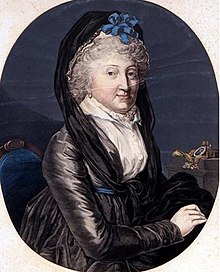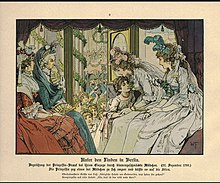Sophie Marie von Voss



Sophie Wilhelmine Charlotte Marie Countess von Voss , née von Pannwitz (born March 11, 1729 in Schönfließ (Oberhavel) ; † December 31, 1814 in Berlin ) lived at the Prussian court for sixty-nine years and was a conversation partner, advisor and lady-in-waiting of queens and kings for decades . She saw four Prussian rulers come and go and new eras dawned. Her diary entries have seen numerous editions since the book was first published in 1876.
Life
Sophie Marie was the daughter of Wolf Adolf von Pannwitz (1679–1750) and his wife Johanna Maria Auguste, geb. from Jasmund. When she was born, Friedrich Wilhelm I , the soldier king, ruled Prussia . Prussia was not yet a major European power. She lived through the entire reign of Frederick the Great (1740–1786) and that of his nephew and heir to the throne Friedrich Wilhelm II (1786–1797). She experienced the occupation of Berlin by the French, the wars of liberation against Napoleon and the reorganization of Europe. The last political entries in her diary refer to the Congress of Vienna: “Nothing good from Vienna; it seems that this unfortunate congress is never ending. ”(December 23, 1814), also:“ A letter from Wittgenstein. The same sad news! ”(December 27, 1814, four days before her death). King Friedrich Wilhelm III. had sent her the entire contract for review and comment. The Countess von Voss was of the opinion that the French had gotten off too well. She described Napoleon as "tyrants", "unscrupulous villains" and "vile people" (diary November 25, 1807). On July 6, 1807, she met Napoleon personally in Tilsit: “He is strikingly ugly, a fat, bloated, brown face, while he is corpulent, small and completely devoid of figure, his large, round eyes roll around eerily, his expression Traits is hardship, it looks like the incarnation of success. "
Sophie spent her childhood with her mother at the court of the wife of the soldier king, Queen Sophie Dorothea . In 1743, at the age of 14, she became her court lady and state lady. For seven years she was devoted to Sophie Dorothea with great admiration.
Prince August Wilhelm , Friedrich's brother ten years his junior, was 23, Sophie, his mother's lady-in-waiting, was 17 when he fell madly in love with her. He wasn't just in love with her, he got mad, jealous, unable to control himself. It was only when Sophie married one of her cousins in order to put an end to inappropriate advertising and stalking that August Wilhelm's feelings cooled down a little. The prince absolutely wanted to be present at Sophie's wedding in 1751 - and passed out.
Her husband, Johann Ernst Graf von Voss (1726–1793), became district president in Magdeburg and from 1763 court marshal of the wife of Frederick the Great in Schönhausen. During the years at the Schönhauser Hof, Sophie was confronted with her own past in a dramatic way: The daughter of her brother-in-law, Julie von Voss , was courted by Friedrich Wilhelm II, made his lover and in 1787 his concubine, gave birth to a son, but soon died thereon. The amorous entanglements of Friedrich Wilhelm repeatedly aroused Sophie's displeasure.
Despite family turmoil, Countess von Voss stayed in Schönhausen until 1786. After her husband's death in 1793, at the age of 64, she withdrew to her estates in Mecklenburg . When Luise von Mecklenburg-Strelitz and her sister Friederike moved to Berlin for the double wedding with Crown Prince Friedrich Wilhelm and his brother in a triumphal procession that was previously unimaginable for the city, Countess von Voss was brought back to Berlin as the Crown Princess and later Queen. She carried the future Friedrich Wilhelm IV. To the baptism.
When Napoleon occupied Prussia and the court withdrew to Memel, she expressed clear political views: “The king sent Colonel Kleist to Napoleon; I wouldn't have done that. ”Kleist thought she was too soft. She reports of extensive visits to the Tsar and his family: “Then there was a ballet in five acts, which alone lasted three hours; it was very pretty, of course, but very long. "
The descriptions of the terrible scenes of Queen Luise's death throes, which lasted several days, go to the heart; Luise, whom she adored and referred to as "angel"; Luise, for whom she would have done anything; Luise, who retained amiability and composure even on her deathbed. Almost the entire royal family had gathered on the deathbed. The political foresight of the lady-in-waiting surprised in old age.
When Sophie Countess von Voss was able to return to her apartment in the Kronprinzenpalais Unter den Linden in February 1811 - the Vossische Zeitung had a special edition printed for the occasion - Russian troops were driving the French out of the city. "Terrible commotion and spectacle on the street that you can't even play whist." The Battle of the Nations near Leipzig, Napoleon's defeat, followed her from her sick bed. “General Stutterheim came to my bed this morning to report the victory to me without equal.” At the victory ceremony on August 15, 1814, she was there: “All the troops, Russians and Prussians together, were entertained by the king today; the tables were lined up tightly across the entire pleasure garden and along the linden trees to the Brandenburg Gate. "
While the Congress of Vienna was still going on, Countess Sophie Marie von Voss died on New Year's Eve 1814 at the age of 85 in Berlin. Her grave, which has not been preserved, was in one of the cemeteries in front of Hallesches Tor . It is not known exactly which one.
literature
- Hermann von Petersdorff : Voss, Sophie Marie Countess von . In: Allgemeine Deutsche Biographie (ADB). Volume 40, Duncker & Humblot, Leipzig 1896, pp. 361-366.
- Sophie Marie Countess von Voss: Sixty-nine years at the Prussian court. From the memories. Translated from the French. Duncker & Humblot, Berlin 1876 ( digitized ; 5th edition 1887: digitized ); New edition based on the text of the 5th edition, 1887: Berlin Story Verlag, Berlin, 3rd edition 2005, ISBN 3-929829-26-6
Web links
- Literature about Sophie Marie Countess von Voss in the state bibliography MV
- Christiane Kopka: March 11th, 1729 - birthday of Sophie Marie Countess von Voss WDR ZeitZeichen from March 11th, 2014 (podcast)
Individual evidence
- ^ Hans-Jürgen Mende : Lexicon of Berlin burial places . Pharus-Plan, Berlin 2018, ISBN 978-3-86514-206-1 , p. 219.
| personal data | |
|---|---|
| SURNAME | Voss, Sophie Marie von |
| ALTERNATIVE NAMES | Voss, Sophie Wilhelmine Charlotte Marie Countess von (full name); Pannwitz, Sophie Marie von; Pannwitz, Sophie Wilhelmine Charlotte Marie von (maiden name); Voss, Sophie Marie Countess of |
| BRIEF DESCRIPTION | German adviser to queens and kings at the Prussian court |
| DATE OF BIRTH | March 11, 1729 |
| PLACE OF BIRTH | Schönfließ (Oberhavel) |
| DATE OF DEATH | December 31, 1814 |
| Place of death | Berlin |